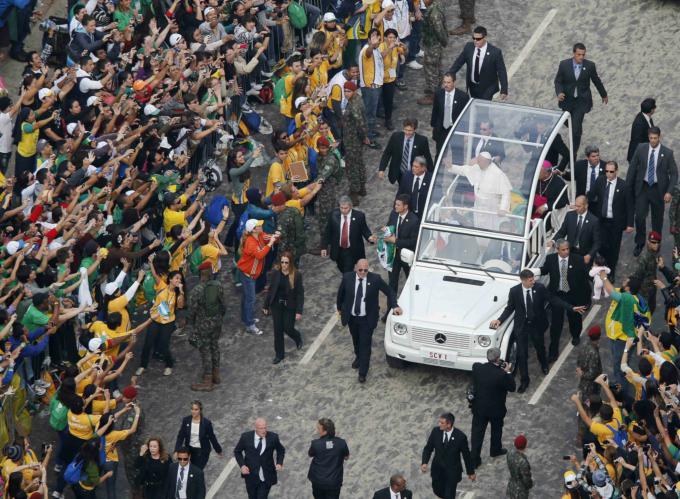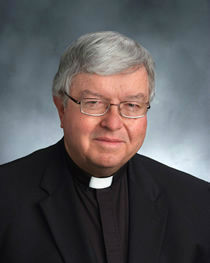
Faith
The guard said, smiling but with a touch of frustration, "You can keep people away from the pope, but you'll never be able to keep this pope away from the people."

Doyle
Q. Who are the men protecting Pope Francis who are wearing suits and ties? Are they part of the Italian national police force, Swiss Guards or a private security firm? (They seem to protect the pope not only at the Vatican, but they travel with him on papal trips.) (Edison, New Jersey)
A. The men you see in suits and ties protecting the pope -- especially on trips outside of Rome -- come from a variety of security forces. The storied 500-year-old Swiss Guard, clad in colorful uniforms when they guard the entrances to the Vatican, also have armed plainclothes members who travel with the pontiff.
In addition, the Vatican has its own 130-member police force, the gendarme corps, who are assigned to accompany the pope. (Domenico Giani, the inspector general of this corps, is the pope's personal bodyguard and is often seen off the front fender of the popemobile.) Also, on foreign visits, the host nation's own security force -- as per diplomatic protocol -- is heavily involved in orchestrating the pope's protection.
The difficulty comes in trying to balance security interests with a pope's desire to minister in a personal way to his flock. Once, shortly after the 1981 attack on St. John Paul II's life at an audience in St. Peter's Square, I asked a Swiss Guard if there would be stricter security protocols in place going forward. The guard said, smiling but with a touch of frustration, "You can keep people away from the pope, but you'll never be able to keep this pope away from the people."
I saw this exemplified in 1995 when St. John Paul visited New York City. I had been charged with managing the movements of the "tight pool," the handful of videographers and still photographers who were given close-up access at each of the papal sites, and so I had a U.S. Secret Service agent assigned to me.
When the pope came out of St. Patrick's Cathedral, the plan had called for him to get into the popemobile and ride the one long block to the cardinal's residence. Instead, St. John Paul decided to wade into the crowd on the sidewalk and began shaking hands. I said to the agent, "That must terrify you when he departs from the plan." To my surprise, the agent said, "Actually, it's the safest thing of all. If we don't know what he's going to do, then nobody else can know either."
Q. I am a cradle Catholic and a product of 16 years of Catholic education. Thirty-seven years ago, I met and married a very nice Methodist girl. (The wedding ceremony was conducted in her church, with both her Methodist minister and a Catholic military chaplain officiating.) We have been blessed with four children who were all baptized Catholic.
Now that the children are grown, my wife and I typically attend separate church services on Sundays, but occasionally (perhaps twice year) I will go to church with her or she will come to Mass with me. When she is with me at Mass, I usually remain in the pew with her at Communion time. But at her church, the minister regularly announces that all who are present are welcome to receive communion.
So my question is this: What is the Catholic Church's teaching about receiving communion at other churches? (Fisherville, Virginia)
A. Except for very limited circumstances, a Catholic is not permitted to receive communion at a non-Catholic service. The church's Code of Canon Law provides that the faithful "receive them (the sacraments) licitly from Catholic ministers alone" (Canon 844.1).
This is based on the Catholic belief that there is an unbroken chain of valid ordination from Jesus and the apostles down through succeeding generations of Catholic bishops, and that the same continuous line does not apply with Protestant ministers.
There is an exception made in Canon 844.2 that allows Catholics to receive the sacraments in Orthodox churches (i.e., "in whose churches these sacraments are valid") in a circumstance where "it is physically or morally impossible to approach a Catholic minister."
- Father Kenneth Doyle is a columnist for Catholic News Service
Recent articles in the Faith & Family section
-
Did you know?Father Robert M. O'Grady
-
Sowing the Seeds of FaithMaureen Crowley Heil
-
Bread left overScott Hahn
-
Scripture Reflection for July 28, 2024, Seventeenth Sunday in Ordinary TimeJem Sullivan
-
What the universal call to holiness entailsDr. R. Jared Staudt





